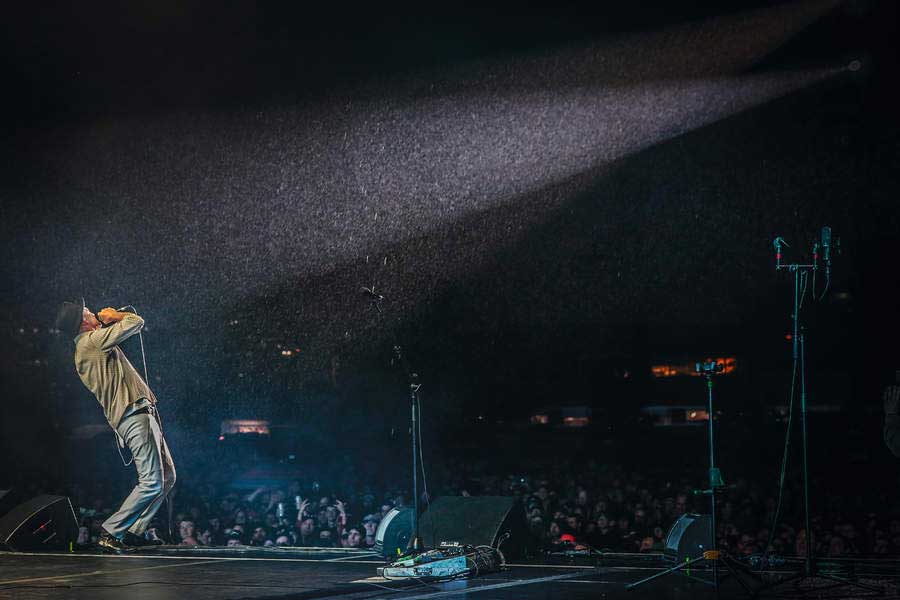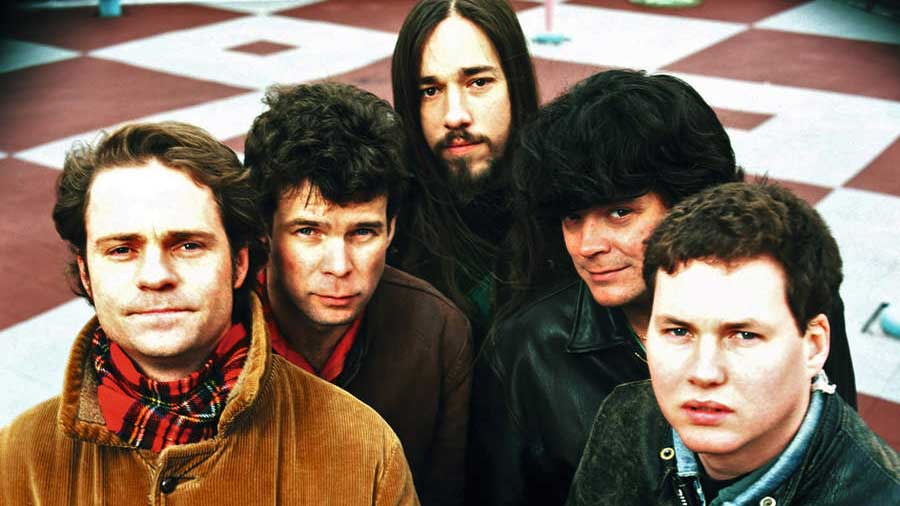In Kingston, Ontario’s Market Square they climbed the rooftops. Hundreds of figures, taking to the parapets for a view of the cinema screen relaying the live feed, while 27,000 people gathered in the square below.
From sea to icy sea, Canada stopped to listen – the streets of Vancouver, Calgary, Ottawa and Montreal throbbed to the sound of the show, with bars and cafés hanging bedsheets outside to project the national CBC TV feed, and every window on every block thrown open to flood the cities with music.
Eleven million people – a third of the Canadian population – watched on TV, and in screening venues from Toronto to Bobcaygeon they gathered in their thousands, dancing, singing, many clutching loved ones close or struggling to hold back tears.
“It’s a night for celebration,” one emotional fan told the news cameras. “It’s a night to unfortunately say goodbye. And at the same time remember who we are as Canadians.”
“It was,” Blue Rodeo guitarist Colin Cripps said in Michael Barclay’s book The Never-Ending Present, capturing the moment, “a communal experience of religious proportions”.
Like a royal wedding, sporting triumph or national day of mourning, August 20, 2016 was the night Canada united. And for the 6,700 people – including prime minister Justin Trudeau – singing O Canada inside Kingston’s K-Rock Centre, at the final gig by the city’s proudest sons and definitive Canadian rock band The Tragically Hip, it was to be a moving farewell.
"It’s been a pleasure doing business with you," sang Gord Downie, smiling wryly in a white top hat as he took one last trip around the songs that had soundtracked so many lives, forged so many identities, struck so many bonds. There were several glittersuit outfit changes, three encores, and one moment of sheer emotional deluge, Downie screaming through the tears during Grace, Too.
After two and a half hours, he left the stage for the final time with a poignant au revoir. "With illusions of someday, cast in a golden light," he sang on his last song, Ahead By A Century, "No dress rehearsal, this is our life."

Fourteen months later, on October 17, 2017, Downie passed away from the terminal brain cancer he’d been battling for almost two years, aged 53. As a national hero widely adored for distilling the Canadian psyche, celebrating the country’s history, championing its culture and encapsulating its nebulous identity in songs that were a mainstay of Canada’s rock radio for 32 years – earning the band nine No.1 albums and eight million sales – mourning was nationwide, tributes effusive.
Trudeau, weeping on TV, called Downie “our buddy Gord, who loved this country with everything he had”. Radio stations played nothing but Tragically Hip songs or renamed themselves ‘Gord FM’ for 24 hours. Silences were held at ice-hockey games, and a candlelit vigil gathered in the small town of Bobcaygeon, made famous as the archetypal Canadian village idyll by The Tragically Hip classic that borrowed its name. A state funeral was considered.
Gathering on Zoom today, the surviving members of The Tragically Hip are understandably muted when discussion turns to their late singer’s final months.
“We were all shocked,” says guitarist Paul Langlois, recalling the diagnosis Gord received after collapsing at his father’s funeral in 2015. “At first it was a rare form of a rare form. There were a lot of people talking with hope that it wasn’t anything terminal. It turned out to be something that, unfortunately, is quite common these days, glioblastoma. He got diagnosed in early November, and by February [2016] he’d had two brain surgeries and we knew the diagnosis [was terminal]. So we didn’t think we were gonna handle it in any other way than to be friends and support.”
Langlois stayed with Downie in Toronto during his treatment, saw him losing much of his memory and get “beat up from the radiation and chemo”. “It didn’t sound like the same Gord,” he says. Yet Downie insisted the band should still tour their latest – and last – album, Man Machine Poem, despite his illness.
"I started calling the other guys, saying: ‘Gord’s asking me if we’re touring this record.’ He was so fucking determined. Then the other guys would come and visit and see for themselves, it just seemed like such a far reach that he would ever be able to do it again. He couldn’t remember anything.”
“Even the night before the tour, I was like: ‘I don’t think this is actually gonna happen’,” says fellow guitarist Rob Baker. “We’re going through the motions for our friend. This is what he wants, and we’re gonna give him what he wants, but this isn’t actually possible. I had major trepidation about doing the whole thing. My fear was that it was gonna be a mass funeral every night.
"And it wasn’t, it was this incredible celebration and there were a lot of tears [in the audience], but a lot of them were really happy tears. As the tour went on, Gord got stronger and stronger. He fed off crowd energy and the love that people were giving to him. I don’t know how I would’ve reacted in Gord’s situation, but I don’t think going on tour would’ve been on my list. But it was critical for him to do that.
“Gord got stronger every day,” Baker continues. “He ended the tour, and I was sitting in the dressing room with him after and he was saying: ‘You guys need to continue and find someone else and maybe we’ll do some more recording. I’ve got some song ideas, I know you’ve got ideas, let’s get together and do this.’ He was thinking about what’s next, what can we do next…”

Today, The Tragically Hip feel plucked from the fire. As arena-level superstars in Canada for much of the past three decades – even though they toured more modest venues elsewhere in the world – there has been much speculation about the band’s unheard material. Just a few years ago, however, it seemed as though any chance of hearing any had gone up in smoke.
“I read something in the New York Times about the big Universal fire in California,” says Baker, talking about the back-lot fire at Universal Studios in 2008, which destroyed over 100,000 Universal Music Group master tapes. “I texted Johnny [Fay, drums] and said: ‘We wouldn’t have had tapes in there?’ And Johnny said: ‘Yeah, there’s a very good chance we did.’ And that just kind of lit the fire under us to start looking.”
Thus began an “archaeological dig” to unearth old tapes and off-cuts from their 13 albums since 1989. A search that so far has turned up three albums’ worth of unreleased songs and, according to bassist Gord Sinclair, “really unified us, gave us a real renewed sense of purpose” in the years following Downie’s death.
Fortunately, The Tragically Hip’s Universal tapes had been transferred to Canada in 2001. By scouring boxes and comparing producers’ handwriting, the band’s CSI-style investigation unearthed lost reels in storage facilities, at Richard Branson’s mastering house in California, in an abandoned mine shaft (converted into tape storage) in Pennsylvania and, Baker jokes, in “Robbie Williams’s swimming pool.”
The first fruit of their hunt is the six-track mini-album Saskadelphia, named after the made-up city they’d claim to be arriving in when the road madness set in. These gritty, visceral leftovers from the New Orleans session that produced their 1991 second album and first Canadian chart-topper Road Apples (Canadian slang for ‘horse droppings’) – now set to be released as part of its 30th-anniversary package – capture the band in their initial, phenomenally popular blues-rock incarnation.
Having formed as college friends inKingston in 1984, their formative years of relentlessly touring the bars and clubs of Ontario bleed easily into the grooves. Two years on from their million-selling 1989 debut Up To Here and its behemoths of Canadian rock radio Blow At High Dough and New Orleans Is Sinking, these rediscovered tracks reveal a road-honed alt.rock band firing on all cylinders.
“We were a really tight little live band,” says Baker. “We were playing about two hundred and fifty shows a year for the three years leading up to that record.”
“When we first put them on, it was still that energy,” adds Sinclair. “It just sounded fresh. We were really fortunate. Our A&R guy at the time was real hands-off. He sent us down to New Orleans to change the history of rock’n’roll, and that was it, that’s all he was asking of us. But he knew that between us and Don [Smith, producer] and what we were doing that we were on to something.”
Watching the band live, it wasn’t hard to see. Their brand of blues rock was infused with the collegiate charm of R.E.M., the roadhouse grit of Midnight Oil and The The, and the melodic sprightliness of The Smiths. Plus, their singer Downie was a gripping showman. Equal parts Michael Stipe and Michael Hutchence, he’d stun audiences with cryptic lyricism, live-wire behaviour and, during interludes in New Orleans Is Sinking, wild tangents – stories, speeches, impromptu Bowie covers or debuts of new songs.

“Gord was a head shaker to people when they first saw him,” says Langlois, “He was just on the loose and he didn’t have a choice. I think he just lost himself inside it. Gord made us different from the rest.”
“The diversions, or ‘Storytime’ as I like to think of it, were purely spontaneous,” adds Baker. “We never rehearsed any of it, we just fed off of Gord’s emotional energy, bringing up our energy as he became more animated, and reining in the energy if he turned introspective.
“There were certainly times that we had trouble getting out of a jam – we kept missing the offramp, so we’d drive on in search of the next one – but I don’t recall any derailments. It was a great way to pull everyone into the moment – no road map. It was exhilarating.”
Why would he do it?
“Because he had balls,” says Fay. “He just was unafraid. He was a very shy person, but when he got up in front of people, a lot of the time people would say: ‘What’s your singer on? He’s all hopped up on something, it’s crazy. Is he on acid or something?’ No, he’s on life. He’s doing a show, he’s entertaining you, and he’s just got bigger balls than anyone I ever met.”
On Road Apples, Downie began to take the lyrical wheel of the Hip, writing often obtuse and surrealist lines steeped in personal vulnerability (Fiddler’s Green, for example, was about the recent loss of his nephew) and – perhaps bugged by being tagged a southern rock band – Canadian history, landscape and identity. Three Pistols referenced the Quebec city of Trois-Pistoles and Canadian landscape artist Tom Thomson.
And by 1992’s third album Fully Completely Canadian themes began to dominate. Fifty Mission Cap paid tribute to Toronto Maple Leafs ice-hockey player Bill Barilko, who died in a float-plane crash in 1951; Courage (For Hugh McLennan) honoured the titular Montreal author; Locked In The Trunk Of A Car was a killer’s eye view of the kidnap and murder of Quebec’s deputy premier Pierre Laporte in 1970; Wheat Kings concerned the 23-year false imprisonment of Winnipeg’s David Milgaard for murder.
There were songs of deep pride, too – Looking For A Place To Happen scoured Canada for the perfect home, and At The Hundredth Meridian saw Downie wishing to be buried "where the great plains begin".
“As a Canadian band, we watched all our Canadian heroes – the Neil Youngs and Joni Mitchells and Leonard Cohens – they all had to go south, cross the border to have a career,” Baker explains. “We watched all these Canadian wannabes sing about their experience at Hollywood High or surfing USA and all that kind of bullshit. It never rang true for any of us, so I think Gord wanted to write about the Canadian experience.
"Everyone knows about Amelia Earhart [aviation pioneer, and the first female to fly solo across the Atlantic], why doesn’t anyone know about Bill Barilko? It’s at least as interesting a story, but no one pays attention.”

A country whose culture seemed overshadowed by its loud, domineering neighbour to the south, Canada took The Tragically Hip to its heart. As their music expanded to take in psychedelic touches and richer atmospheres on albums such as Day For Night (1994), Trouble At The Henhouse (1996) and Phantom Power (1998), the band gradually grew stadium-sized. They were national icons, with streets named after them and ballets set to their music. They even appeared on stamps. Yet outside Canada they played mid-sized theatres. The best of both worlds?
“It’s been really great from that perspective,” Sinclair attests. “It’s been kind of wonderful to always have the chance to make the left turn at the American border and go back to playing a larger club. I think we’ve had a really idyllic career in a lot of ways.”
“We had a career that ninety-nine per cent of bands out there would envy, as far as touring the States,” says Baker. “We played arenas in some cities. But if you’re playing to twelve hundred, fifteen hundred, two thousand people a night, that’s a good career.”
There were downsides to their Canadian fame. There was the odd fan “hammered out of his brain, running around with the Canadian flag in the show”, who they’d have to have “parked by the kerb” by their security guy. Plus, as Baker notes: “If you advertise anywhere else besides Canada that this is Canada’s biggest band, it’s kind of an invitation to not come to the show.”
Yet on a perpetual upward trajectory and not bothered by any serious infighting or addiction, the Hip had a remarkably smooth 32-year ride. Which made it all the more heartbreaking when the road ran out
“We were in a zombie state [on the final tour], because we had to get up there and do the job and you couldn’t think about it,” says Baker. “If I was thinking about what was actually transpiring, I don’t think I could’ve done the job.
"Then we get to the end of it and it’s the last night, it’s the last show, you’ve played your last note as a band and it’s been your lifelong dream and it’s what you’ve devoted your whole life to and it’s: ‘Well, great show, boys, now unpack the cases and go home.’ There was a lot of processing over the next few years, just thawing out a little bit.”
“It really affected everyone in the country,” says Langlois, “and it almost put us into a zombie-ish sort of state for a couple of years because you’re seeing it every day. People were writing about him and about us. There was an outpouring of emotion. Of course [we were] grieving a lifelong great friend, but then there was also the public being so affected – sad story, fuck, a real bad hand, fifty-three years old, four kids. It was pretty heavy.”
In the wake of Downie’s death, despite his entreaties for them to continue, the surviving members declared that the Hip had died with him.
“We wouldn’t be the Hip without Gord,” Baker said, and the band have since focused on solo projects, the archival hunt, and an investment in a cannabis company. Then at the Juno Awards in June 2021, the Hip reunited to perform 2002’s It’s A Good Life If You Don’t Weaken, fronted by Canadian singer Feist. An augur of more shows to come?
“We’re back in the mode of ‘No, probably not,’” says Langlois. “It’s something we really don’t talk about… because we’re not gonna be the Hip again.”
Baker grins to himself. “I play Sean Connery on this,” he says. “'I will never play James Bond again.’ And then he sat one out and came back. Then ‘That’s it, never again.’ Then he came back and did Never Say Never Again.”
One thing’s for sure: from the Yukon to Bobcaygeon, Canada’s breath is bated for any more shots from the Hip.

